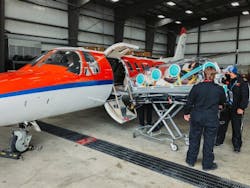Canada Launches EpiShuttles in the Fight Against the Corona Virus
Keewatin Air is now ready to deploy the isolation pod EpiShuttle, for safe transportation of contagious patients. Canada is facing an increasing number of COVID-19 cases and safe transport is key to handle the pandemic.
The past week Keewatin staff and hospital staff at the Health Sciences Centre’s simulation lab and Stretcher Service of Manitoba have gone through extensive training including trial runs in using the EpiShuttle.
"We now have operational certification from Transport Canada to deploy single-patient isolation and transport units, called EpiShuttles in our Pilatus PC-12 planes. Keewatin, along with Alberta Health Services fixed wing air ambulance has EpiShuttles in operating," says Janet Busse, Executive Director of Medical Operations at Keewatin Air.
With the EpiShuttles in place, the medivac services providers can perform patient monitoring and full intensive care of infected patients during air, sea and land transport.
"Canadian healthcare workers and first responders are making an admirable effort transporting patients while putting their own health on the line. We hope that the EpiShuttle will make their job safer and patient transport easier," Ellen Cathrine Andersen, CEO of EpiGuard says.
In case of a local outbreak, Keewatin Air can with their EpiShuttles offer fast and safe transport, even from remote locations. The aircraft PC-12, is widely used in the north, where its short takeoff and landing capabilities make it able to service the smallest and remote communities with modest airstrips. This includes missions to Alert which is the most northerly community in Canada and the world at latitude 82 degrees about 800 miles from the North pole.
Keewatin Air is subsidiary of a larger group of airlines owned by Exchange Income Corporation and operates a variety of aircraft within the group, with that Keewatin Air is also working on certificates to do mass evacuations with EpiShuttles in ATRs and Dash 8s as well. In hotspots with COVID-19 outbreaks, patients need transport to places with available ICU capacity. Only when safe transport is in place can Canada utilize the full capacity of the entire health care system and ensure treatment for everyone.
"We found the EpiShuttle to have unparalleled features. The EpiShuttle allows patient monitoring and full intensive care treatment during transport, including emergency procedures like intubation and insertion of central venous catheters. In addition, for COVID-19 patients, the adjustable backrest is extremely important to keep coughing at a minimum. However, it was the fact that the EpiShuttle is re-usable, making it the most cost efficient product on the market, which made us decide on the EpiShuttle," says Janet Busse.
"The EpiShuttle make transport safe, reduce cost and increase operational efficiency of COVID-19 patient transport. An ambulance usually requires 2-4 hours of disinfection between every infectious transport, and with an entire aircraft, it can take almost a full day. Disinfection puts transport vessels out of play, and in case of exposure, a whole team can be grounded for days. The pandemic compromise the entire medivac system. That is why it is crucial with airtight single patient isolation and transport," Ellen Cathrine Andersen explains.
The EpiShuttle is in use all over the world, in all continents. Five major Air-Forces have already purchased the EpiShuttle as well as ground ambulance services, private air transport companies and hospitals. The EpiShuttle is NATOs stock listed and CE-marked as a class one medical device.
